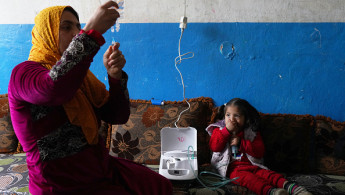Lebanese and Syrian ministers meet to plan deportation program
Lebanese and Syrian officials met in Syria on Monday to discuss a plan to deport 15,000 Syrian refugees from Lebanon per month, despite intense public criticism.
The two country's officials released a statement after the meeting that "there is a consensus in the vision between the Syrian and Lebanese sides regarding the return of all refugees, not just 15,000 displaced persons per month."
The meetings were held between the Lebanese Minister of Displaced Issam Sharafeddine and the Syrian Minister of Local Administration and Environment, Hussein Makhlouf, and Syria's Interior Minister.
Lebanon announced a plan to begin deporting Syrian refugees back to Syria on 4 July, despite the UNHCR's and human rights monitors' protests. Lebanon hosts 1.5 million Syrian refugees, most of whom live in dire conditions.
Lebanese officials insisted in Monday's meeting that a "safe, dignified and voluntary return" would be ensured for Syrian refugees. Syrian officials in turn said that amnesty would be guaranteed for returning refugees.
Rights organisations regularly report that conditions in Syria are not safe for return. A report by Human Rights Watch (HRW) in October 2021 said that returnees were exposed to arbitrary arrest and violence at the hands of Syrian regime forces.
"Most of Syria is controlled by the same leader and his notorious security agencies, the same perpetrator of crimes against humanity that refugees fled in the first place," Nadia Hardman, a researcher with HRW, told The New Arab.
"Forcing refugees back to Syria breaches Lebanon's customary international law obligation not to return someone to a place where they may face grave human rights violation," Hardman said.
While Lebanon has not signed the 1951 Refugee Convention, it is still obligated under international law not to return asylum seekers to areas where they would be in danger.
She added that HRW has documented cases of refugees who were given amnesty by the regime being tortured by regime forces upon their return.
Lebanon and Syria's refugee return plan would see Syrians returned to their cities and villages, where they would be put in temporary resettlement centres until the areas were "refurbished."
The details of this plan have not been released and analysts have expressed doubts that either state would have the capacity to implement such a wide-reaching program.
"The problem with these so-called resettlement centres is that there will be no transparent and accountable way of monitoring the human rights situation within them. Any violations will simply go unreported," Hardman said.
Syrian officials on Monday claimed that "five million displaced Syrians" have already been resettled in such a way. "They have become stable in their areas with full services being provided," Makhlouf said.
Contrary to Syrian figures, the UN has reported that only about 315,000 Syrian refugees have returned since 2016.





 Follow the Middle East's top stories in English at The New Arab on Google News
Follow the Middle East's top stories in English at The New Arab on Google News


